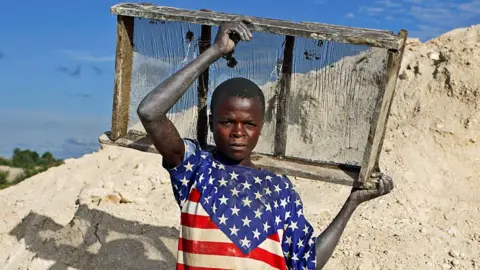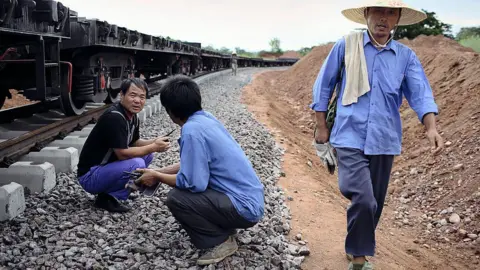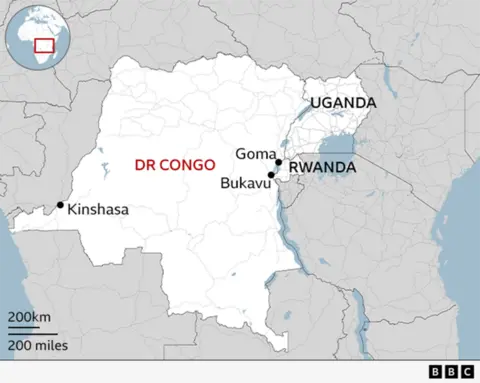 Getty Photos
Getty PhotosThe Trump administration is spearheading an formidable, however controversial, peace initiative aimed toward ending the long-running battle in jap Democratic Republic of Congo that has additionally drawn in neighbouring Rwanda.
Its mediation efforts come as no shock, as DR Congo – a nation within the coronary heart of Africa – is endowed with the mineral wealth that the US requires to energy the IT, and now AI, revolutions, a lot of which is presently going to China.
US President Donald Trump is anticipated to host the leaders of DR Congo and Rwanda – Félix Tshisekedi and Paul Kagame – within the coming weeks to seal a peace settlement that he has hailed as a “superb triumph”, hoping to again it up with offers that may increase US funding within the area.
US-based World Peace Basis govt director Prof Alex de Waal advised the BBC that the Trump administration was selling “a brand new mannequin of peace-making, combining a populist efficiency with business deal-making”.
“Trump has executed this in Ukraine additionally. He needs to get the glory to spice up his personal political standing, and to safe minerals which can be in America’s pursuits,” Prof De Waal stated.
Nevertheless, he famous that “in DR Congo, China has already snapped up lots of the minerals so the US is taking part in catch-up”.
He stated that thus far US firms had been cautious about investing in DR Congo due to security considerations and the “ethical hazard” of dealing in so-called “blood minerals” – minerals financing rebellions – however this might change because the Trump administration applied its peace mannequin.
Prof De Waal stated this might additionally occur in different conflict-hit states like Sudan, the place the Trump administration – together with Arab nations reminiscent of Saudi Arabia, the United Arab Emirates and Egypt – was anticipated to get entangled in mediation efforts after earlier initiatives failed.
He added that the Trump administration’s peace mannequin couldn’t be dismissed out of hand, particularly if it stops preventing that has killed 1000’s of individuals and displaced thousands and thousands of others in conflicts which have raged for greater than 30 years in jap DR Congo.
“Trump can get the totally different sides to speak, and shake issues up,” Prof De Waal stated.
However Prof Hanri Mostert, an instructional on mineral regulation on the College of Cape City, South Africa, advised the BBC that DR Congo “risked compromising sovereignty over its minerals”.
DR Congo may discover itself locked into offers for years, in trade for obscure ensures of safety, she stated.
This was harking back to the “resource-bartering” offers pursued by China and Russia in quite a few African states, Prof Mostert added.
She cited for instance Angola, the place China constructed infrastructure in trade for oil.
“Even when oil costs went up, Angola could not get extra worth for it,” Prof Mostert stated.
 Getty Photos
Getty PhotosThe US State Division stated in 2023 that DR Congo had an estimated $25trn (£21.2trn) in mineral reserves.
This included cobalt, copper, lithium, manganese and tantalum – wanted to make the digital elements utilized in computer systems, electrical automobiles, cell phones, wind generators and army {hardware}.
“For a way lengthy will DR Congo have to provide its cobalt to US traders? Will it’s 20 years or 50 years? What’s the worth for peace?” Prof Mostert requested.
DR Congo authorities spokesman Patrick Muyaya confirmed to the BBC’s Newsday programme in March that his nation needed to produce the US with “some important minerals” in trade for a safety deal.
The M23 insurgent group launched a significant offensive early this yr, seizing big areas of jap DR Congo and smuggling minerals throughout the border to Rwanda, UN experts said in a report earlier this month.
The minerals had been then combined with Rwandan manufacturing, and “their subsequent export to downstream actors reached unprecedented ranges”, the UN specialists added.
Rwanda denies accusations that it backs the M23, despite the fact that the UN has supplied proof it has 1000’s of troopers in DR Congo.
In what seems to be an try to deal with the difficulty of mineral smuggling, the US-brokered peace deal between DR Congo and Rwanda supplies for a still-to-be negotiated “regional financial integration framework” between the 2 rival states.
This is able to “guarantee illicit financial pathways are blocked” and “mutually useful partnerships and funding alternatives” created for “better prosperity – particularly for the area’s inhabitants”.
“We’re getting, for america, a whole lot of the mineral rights from the Congo as a part of it,” Trump stated, forward of the peace deal signed by representatives of the two governments on 27 June in Washington.
A DR Congo researcher with the South Africa-based Institute for Safety Research think-tank, Bram Verelst, advised the BBC that the US initiative was operating in tandem with one other one being led by Qatar, an in depth US ally.
Mr Verelst stated the US’s focus was primarily on the regional dimension, whereas Qatar’s was on home points between DR Congo’s authorities and the M23 insurgent group that has arrange its personal administration within the east after capturing the regional capital, Goma.
Prof Jason Stearns, a Canada-based political scientist who specialises within the area, advised the BBC that Qatar, like different oil-rich Gulf states, was increasing into Africa “to mission energy, affect, but in addition to hunt financial alternatives”.
He added that it grew to become concerned in mediation efforts on the request of Rwanda, which perceived the US as being in favour of DR Congo, one thing Washington denies.
Prof Stearns stated Qatar had “large” financial pursuits in Rwanda, stating that the Gulf state was constructing a brand new multi-billion greenback airport in Kigali and was in talks to amass a 49% stake within the nationwide airline.
He defined that the US and Qatar had been working intently collectively, however it was lower than superb to have two processes as a result of “you do not need to find yourself in a state of affairs the place there’s a peace deal between DR Congo and Rwanda, however Rwanda then says: ‘We do not management the M23’, and the M23 continues escalating [the conflict] in jap DR Congo”.
“So it is essential that the 2 processes are tightly tied to one another because the actors are so intently linked,” Prof Stearns added.

Beneath the peace deal, DR Congo and Rwanda agreed to launch a “safety co-ordination mechanism” inside 30 days of the 27 June deal.
Mr Verelst stated {that a} ceasefire was anticipated to take impact on Tuesday, adopted by the DR Congo authorities and the M23 signing a complete peace settlement by 18 August, constructing on the “declaration of ideas” that they had already negotiated.
DR Congo-based Worldwide Disaster Group (ICG) think-tank analyst Onesphore Sematumba stated the US and Qatar had been getting offers struck in “file time” since Trump’s rise to the US presidency in January.
Mr Sematumba stated their intervention got here after numerous Africa-led mediation efforts had “did not get the events to signal even a single doc” since 2022.
“Regional gamers should not have the identical leverage to affect Kigali and Kinshasa,” he added.
“However between the signing of an settlement and the achievement of peace, the highway might be lengthy, and it will likely be lengthy on this case,” Mr Sematumba warned.
One key query is whether or not the M23 will surrender the territory underneath its management, as demanded by Tshisekedi’s authorities.
Mr Sematumba stated the M23 had agreed to “state authority” being established throughout DR Congo, nonetheless, the rebels have additionally stated they might not surrender a “single centimetre” of land.
“Personally, I believe the transition needs to be gradual, and for sure areas there needs to be some form of co-management. However the whole lot will rely on the tact of the mediators, and their capability to interrupt the ice,” Mr Sematumba added.
He stated the success of the peace initiative additionally hinged on what the settlement known as the “lifting of defensive measures” by Rwanda, extensively interpreted to imply the withdrawal of its troops from jap DR Congo.
Whereas Rwanda denies backing the M23, it says it needs to wipe out the FDLR, a militia born from those that carried out the 1994 genocide in Rwanda after which fled into DR Congo. Rwanda has accused the Congolese military of working with the FDLR.
The peace deal spells out that the FDLR needs to be “neutralised”, nonetheless this has been tried a number of occasions over the previous three many years.
“For Rwanda, the neutralisation of the FDLR is a precondition for the withdrawal of its forces, whereas DR Congo says the 2 have to be achieved concurrently,” Mr Sematumba identified, saying that mediators must discover a answer as these points had led to the failure of earlier peace initiatives.
“Simply by following the totally different interpretations given by the events to the texts signed, you possibly can sense all of the difficulties that lie forward,” Mr Sematumba stated.
Prof Mostert agreed that diplomacy by itself couldn’t obtain peace, and a broader initiative was wanted.
“You construct peace by reworking ache. That takes greater than diplomacy. It takes dialogue, decentralised participation and dignifying folks’s experiences,” she stated.
“That is why I imagine it is crucial that the dealmakers and the lawmakers stay conscious of historic traumas, together with many years of useful resource exploitation,” Prof Mostert added.
So if he needs the peace to carry for lengthy sufficient for US firms to revenue, Donald Trump could must maintain the strain on for a while to come back.
 Getty Photos/BBC
Getty Photos/BBC